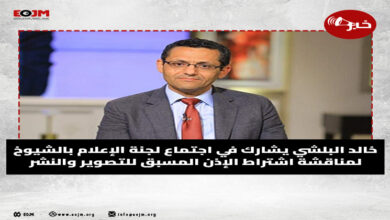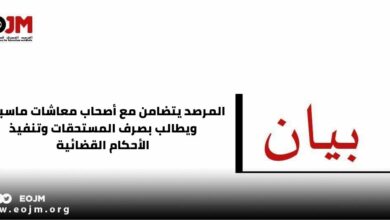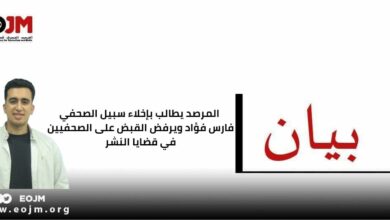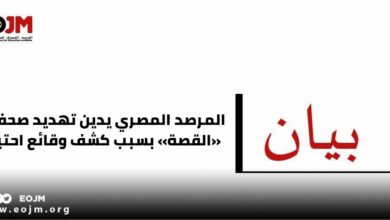بيان صحفي| من غزة إلى طهران.. الكيان الصهيوني يُوسّع دائرة الحرب على الصحافة
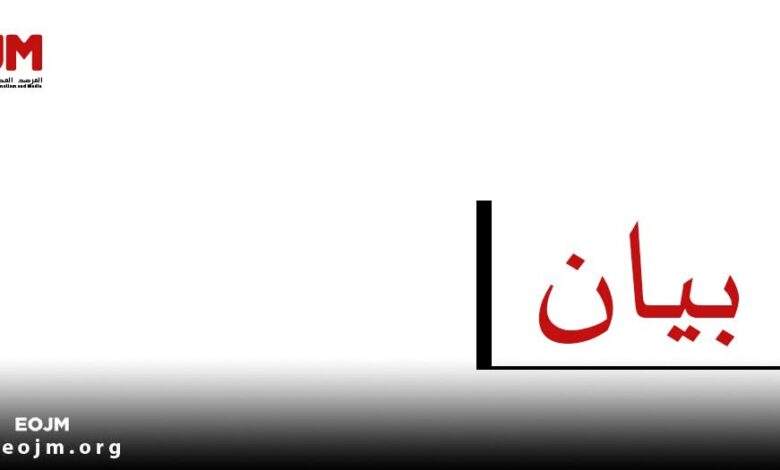
يدين المرصد المصري للصحافة والإعلام، بأشد العبارات، الاستهداف الإسرائيلي لمحيط مبنى هيئة الإذاعة والتلفزيون الإيرانية في العاصمة طهران، صباح الإثنين 17 يونيو 2025، والذي أسفر – وفق ما أعلنته وسائل إعلام إيرانية – عن سقوط قتلى وجرحى بين العاملين بالهيئة، وتوقف بث قناة الأخبار بشكل مؤقت.
ورغم أن الهجوم – بحسب وكالة فارس – لم يكن واسع النطاق، فإنه يحمل دلالة رمزية خطيرة، كونه موجّهًا ضد منشأة إعلامية سيادية في دولة عضو بالأمم المتحدة، وهو ما يُعد امتدادًا لنمط متكرر من استهداف البنية الإعلامية في المنطقة، وبث الرعب في نفوس الصحفيين والمؤسسات الإعلامية، التي لا تنسجم مع السردية الإسرائيلية.
ويأتي هذا التطوّر بعد مرور أكثر من شهرين على الجريمة التي ارتكبها جيش الاحتلال الإسرائيلي، فجر 7 أبريل 2025، بقصف خيمة تضم صحفيين قرب مستشفى ناصر في مدينة خان يونس، جنوبي قطاع غزة، ما أسفر عن استشهاد الصحفي حلمي الفقعاوي، مراسل وكالة “فلسطين اليوم”، وإصابة عدد من زملائه، وتدمير كامل لموقعهم، في مشهد يُجسد استهتارًا ممنهجًا بالقانون الإنساني الدولي، وسلوكًا عدائيًا ضد أي محاولة لتوثيق الحقيقة من الميدان.
وبحسب المكتب الإعلامي الحكومي في غزة، فإن عدد الشهداء من الصحفيين منذ بدء العدوان الإسرائيلي على القطاع في 7 أكتوبر 2023، بلغ نحو 210 صحفية وصحفيًا، وهو رقم غير مسبوق في التاريخ الحديث للحروب، ويعكس حجم الكارثة التي يتعرض لها الجسم الصحفي الفلسطيني.
إن هذا النمط من الاعتداءات لم يعد محصورًا في إطار “الأضرار الجانبية” أو “حوادث فردية”، بل يعكس سياسة ممنهجة تستهدف تصفية الشهود، وإخراس الرواية الأخرى، وتحويل العمل الصحفي إلى نشاط محفوف بالموت.
وإزاء هذا التصعيد المتواصل، يُحمّل المرصد المصري للصحافة والإعلام سُلطات الاحتلال الإسرائيلي المسؤولية القانونية الكاملة عن الجرائم المرتكبة بحق الصحفيين والمؤسسات الإعلامية، سواءً في فلسطين أو لبنان أو إيران، كما يُحمّل المجتمع الدولي – وفي مقدمته الدول التي توفر غطاءً سياسيًا أو دعمًا ماديًا للاحتلال – مسؤولية الصمت، والتواطؤ غير المباشر في تغذية مناخ الإفلات من العقاب.
ويُذكّر المرصد بأن المادة (79) من البروتوكول الإضافي الأول لاتفاقيات جنيف لعام 1977، تنص صراحةً على حماية الصحفيين أثناء النزاعات المسلحة، بوصفهم مدنيين يمارسون مهنة ذات طابع خاص، وأن استهدافهم يُعد انتهاكًا جسيمًا يرقى إلى جريمة حرب.
ويدعو المرصد إلى اتخاذ خطوات ملموسة تتجاوز الشجب والإدانة، ويطالب بـ:
1. فتح تحقيق دولي عاجل في حادثتي قصف خيمة الصحفيين بخان يونس، واستهداف مبنى هيئة الإذاعة والتلفزيون في طهران، تحت إشراف جهات أممية مستقلة.
2. تفعيل آلية حماية دولية دائمة للصحفيين العاملين في مناطق النزاع، تشمل الأراضي الفلسطينية ولبنان وسوريا واليمن وإيران.
3. إدراج جرائم استهداف الصحفيين ضمن الملفات النشطة أمام مجلس حقوق الإنسان والمحكمة الجنائية الدولية، باعتبارها انتهاكات ممنهجة لحرية التعبير.
لقد باتت الكاميرا تُعامل كعدو ميداني، وأصبحت أقلام الصحفيين تُدرج ضمن قائمة الأهداف العسكرية، وهو ما يستدعي موقفًا دوليًا حاسمًا يُعيد الاعتبار لقيم الصحافة الحرة، ويكفل محاسبة كل من يتورط في قمعها أو تصفيتها.
فالصحفيون ليسوا أهدافًا مشروعة، ومن يقصف خيمة تحتضن كاميرا، إنما يخشى من الحقيقة أكثر مما يخشى من الرصاص.
Press Statement | From Gaza to Tehran: Israel Expands Its War on Journalism
In an alarming escalation of attacks on press freedom, the Israeli occupation has widened its assault beyond Gaza, striking at media institutions abroad.
The Egyptian Observatory for Journalism and Media strongly condemns the Israeli strike targeting the vicinity of the headquarters of the Islamic Republic of Iran Broadcasting (IRIB) in Tehran on Monday, June 17, 2025. According to Iranian media outlets, the attack resulted in casualties among IRIB staff and led to the temporary suspension of the news channel’s broadcast.
Although the strike was reportedly limited in scope—as noted by the Fars News Agency—it constitutes a grave symbolic assault on the media sovereignty of Iranian state institutions. It also sends a chilling message to independent media outlets across the region, reinforcing a well-established pattern of targeting dissenting voices and suppressing resistant narratives.
This latest attack follows a prior war crime committed by Israeli forces on April 7, 2025, when a group of journalists was struck by an air raid while stationed in a press tent near Nasser Hospital in Khan Younis, southern Gaza. The strike resulted in the killing of journalist Helmi Al-Faqaawi, correspondent for Palestine Today, and injured several others, The press tent was completely destroyed, in a scene that epitomizes the total disregard for international humanitarian law and the deliberate targeting of those documenting the truth.
According to Gaza’s Government Media Office, the number of journalists killed since the start of Israel’s assault on the Gaza Strip on October 7, 2023, has risen to approximately 210, making it one of the highest recorded tolls of journalist casualties in modern conflicts. This unprecedented toll reflects the scale of the humanitarian and professional catastrophe facing Palestinian journalists.
These are no longer isolated incidents or “collateral damage.” What we are witnessing is a systematic policy aimed at eliminating witnesses, silencing alternative narratives, and transforming journalism into a perilous, near-suicidal endeavor.
In light of this alarming escalation, the Egyptian Observatory for Journalism and Media holds the Israeli occupation authorities fully responsible for the crimes committed against journalists and media institutions in Palestine, Lebanon, and Iran. We also hold the international community—particularly states offering political cover, financial support, or rhetorical justifications—accountable for enabling this hostile environment through silence, funding, or political cover.
The Observatory recalls that Article 79 of Additional Protocol I to the Geneva Conventions (1977) explicitly mandates the protection of journalists during armed conflicts, recognizing them as civilians engaged in a profession of special importance. The repeated targeting of journalists, therefore, constitutes a grave breach amounting to a war crime.
Accordingly, the Observatory calls for concrete international measures beyond condemnation:
1. The immediate launch of an international investigation—under the supervision of independent UN bodies—into the April 7 strike on the journalist tent in Khan Younis, and the June 17 attack on the IRIB headquarters in Tehran.
2. The activation of a permanent international protection mechanism for journalists operating in conflict zones, including Palestine, Lebanon, Syria, Yemen, and Iran.
3. The formal inclusion of journalist-targeting crimes within the dockets of the Human Rights Council and the International Criminal Court, as systematic violations of freedom of expression.
4. Journalistic tools—cameras and pens alike—are increasingly perceived by aggressors as strategic threats rather than instruments of truth. This reality demands an unequivocal international stance that upholds press freedom and holds perpetrators accountable.
Journalists are not legitimate targets. He who bombs a tent sheltering a camera fears testimony more than gunfire.

